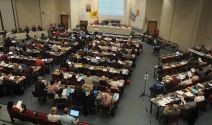Dialogue is 'Only Solution' to Syria's Civil War, Says WCC

Despite an intensifying military conflict in Syria amid accusations that countries are arming pro-government and rebel forces, members of the World Council of Churches' governing body on Tuesday called for all parties involved to seek dialogue as the only solution for ending the civil war which has triggered an internal and external refugee crisis.
The WCC Central Committee, meeting in Kolympari, Crete, Greece for its last meeting before next year's assembly in Busan, South Korea, called for "an end to violence in all forms."
"[The Committee] calls for all parties to engage in dialogue – as the only solution – in order to safeguard the unity and pluralistic nature of historic Syria for a better future for generations to come, and in order to promote respect for the principles of justice, freedom, human dignity, social justice and citizenship rights," the Committee said.
The Committee said it appealed "to the international community to respect the ability and responsibility of the Syrian people to find solutions to the crisis, and to refrain from outside military interventions."
It also said it "[p]rays for the reign of peace and justice in Syria and in all countries in the Middle East, so that people of different faiths live together in harmony and love, and manifest God's love for all creation.
"God of Life: Lead us to Justice and Peace,'" the Committee said, echoing the theme of next year's assembly.
The call for an end to the violence comes as U.N. Secretary General Ban Ki-moon told the U.N. General Assembly on Tuesday that other countries are arming both sides of the conflict. The U.N. and Western officials have accused Iran of supplying arms to government forces, while Syrian officials have accused Qatar and Saudi Arabia of arming rebels.
"This conflict has taken a particularly brutal turn,' Ban told the Assembly. "The continuing militarization of the conflict is deeply tragic and highly dangerous."
"Those who provide arms to either side are only contributing to further misery – and the risk of unintended consequences as the fighting intensifies and spreads," he said.
"How many more will be killed and wounded, their lives shattered, before President Assad and his advisers are persuaded to change course?" Ban asked. "How can we convince armed groups that a better future lies not in fighting, but in building the foundations of a new political and social contract that guarantees freedom and justice?"
Moon said the UN would assist all parties to build a Syrian-led alternative to the use of force. Ban said he would go to Cairo for consultations with the League of Arab states before going as soon as possible to Syria's capital Damascus.
In February, the WCC executive committee affirmed the message made in December 2011 by three heads of churches in Syria - His Beatitude Patriarch Ignatius IV, His Holiness Patriarch Zakka I, and His Beatitude Patriarch Gregorios III – in which they refused "they use of any type of violence" and called for the "respect of the principles of justice, freedom, human dignity, social justice and citizenship rights."
In the February statement, the WCC expressed confidence that "the churches in Syria, which are deeply rooted in the land, and have developed a long historic experience of engagement in the life of the society will have an important role in national dialogue especially in this critical and difficult moment".